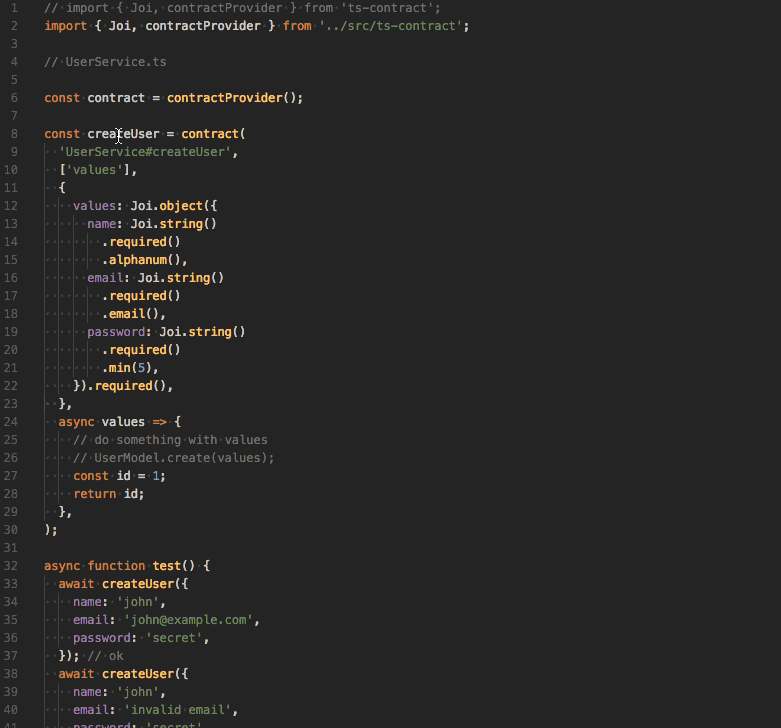ts-contract v0.0.9
Typescript Contract
ts-contract is a TypeScript library for validation and logging.
It depends on joi (validator) and bunyan (logger)
NOTE Works only with Typescript 2.8+.
About
The motivation is to provide a library for contract programming that works well with TypeScript.
There are many existing libraries for data validation that rely heavily on decorator annotations. Unfortunately, decorators have many flaws:
- it's an experimental feature, and its syntax is going to change,
- redundant syntax because we must create special classes instead of using plain objects,
- it's a runtime feature, and there are some bugs related to reflection,
no type inference, any typos or mistakes cause a runtime error instead of a compilation error.
Since Typescript 2.8, it's possible to use conditional types, that allow us to map one type to another. It's a powerful feature that can extract a Typescript interface from the Joi validation schema.
See the example below. There are no TypeScript annotations. It's pure JavaScript code, but we have type checking inferred from Joi.

Features
- Full type inference for input parameters extracted from the Joi schema definition.
- Input validation and normalization (example: string type
"2"to number type2). - Input logging (input parameters):
myService: ENTER methodName: {param1: 'foo', param2: 'bar'}- Output logging (sync and async):
myService: EXIT methodName: {result: 'foobar', anotherProp: 'bar'}- Error logging with input parameters (see example below).
Contract Programming
Getting Started
npm install ts-contractyarn add ts-contractExample usage
// services/CalcService.ts
import { Joi, contractProvider } from 'ts-contract';
// It's recommended that you configure the provider once and all
const contract = contractProvider();
export const add = contract(
'CalcService#add',
['a', 'b'],
{
a: Joi.number().required(),
b: Joi.number().required(),
},
(a, b) => a + b,
{ sync: true },
);use service
// app.ts
import * as CalcService from './services/CalcService';
CalcService.add(1, 3); // returns 4
CalcService.add('5' as any, '6' as any); // returns 11, input parameters are converted to number types
CalcService.add('1' as any, { foo: 'bar' } as any); // logs and throws an error
// NOTE: you shouldn't use casting `as any` in your code. It's used only for a demonstration purpose.
// The service is expected to be called with unknown input (for example: req.body).
See example under examples/example1.ts. Run it using npm run example1.
Async example usage
file services/UserService.ts
// services/CalcService.ts
import { Joi, contractProvider } from 'ts-contract';
const contract = contractProvider();
export const createUser = contract(
'UserService#createUser',
['values'],
{
values: Joi.object({
name: Joi.string()
.required()
.alphanum(),
email: Joi.string()
.required()
.email(),
password: Joi.string()
.required()
.min(5),
}).required(),
},
async values => {
// do something with values
// UserModel.create(values);
const id = 1;
return id;
},
);use service
// app.ts
import * UserService from './services/UserService';
await UserService.createUser({
name: 'john',
email: 'john@example.com',
password: 'secret',
}); // ok
await UserService.createUser({
name: 'john',
email: 'invalid email',
password: 'secret',
}); // throws an error
See example under examples/example2.ts. Run it using npm run example2.
Removing security information
By default properties password, token, accessToken are removed from logging.
Additionally you set options to {removeOutput: true} to remove the method result.
Example:
file services/SecurityService.ts
// services/SecurityService.ts
import { Joi, contractProvider } from 'ts-contract';
const contract = contractProvider();
export const hashPassword = contract(
'SecurityService#hashPassword',
['password'],
{
password: Joi.string().required(),
},
password => 'ba817ef716',
{ sync: true },
);use service
// app.ts
import * as SecurityService from './services/SecurityService';
securityService.hashPassword('secret-password');
See example under examples/example3.ts. Run it using npm run example3.
API Docs
import {contractProvider} from 'ts-service';
const contract = contractProvider({
removeFields: string[], // the array of fields not won't be logged to the console, default: ['password', 'token', 'accessToken'],
debug: boolean, // the flag if ENTER and EXIT logging is enabled, (errors are always enabled), default: true
depth: number, // the object depth level when serializing, default: 4
maxArrayLength: number, // the maximum number of elements to include when formatting an array, default: 30
getLogger: (serviceName: string) => Logger, // a function to create a new bunyan logger instance for the given service.
// default: creates a logger with options {name: serviceName, level: this.debug ? 'debug' : 'error' }
getNextId: () => number // a function to get the next service call id, default: function that returns sequence 1,2,3 ...
})
contract(
signature, // the method signature in format `serviceName#methodName`, example `UserService#register`
[param1, param2], // the names of the function parameters
{
param1: Joi.string()...,
param2: Joi.number()...,
}, // the validation rules for parameters
(para1, param2) => {...}, // the function to wrap
{
sync: true/false, // the flag if the flag is async (promise) or async. In sync mode errors are thrown, in async mode Promise.reject is returned. Default: false
removeOutput: true/false, // the flag if the output must be removed in the log, default: false
}
)Special properties
if the parameter name is req it's assumed that the object is an express request.
Only properties are logged: method, url, headers, remoteAddress, remotePort.
if the parameter name is res it's assumed that the object is an express response.
Only properties are logged: statusCode, header.
Notes
- The wrapped function must have 0-4 arguments.
- You can always override the inferred type. For example, if you need union types or more complex schema (e.g. alternatives).
const foo = contract(
'CalcService#foo',
['str'],
{
str: Joi.string().only('admin', 'user').required(),
},
(str: 'admin' | 'user') => a + a,
{ sync: true },
);- If there are any bugs in Joi annotations. Please open an issue and override the typings manually (see previous point).
- Annotations for joi are custom. Do not install
@types/joi.
License
MIT
